Health
Four MakSPH Faculty inducted as Prestigious UNAS Fellows
Published
8 months agoon
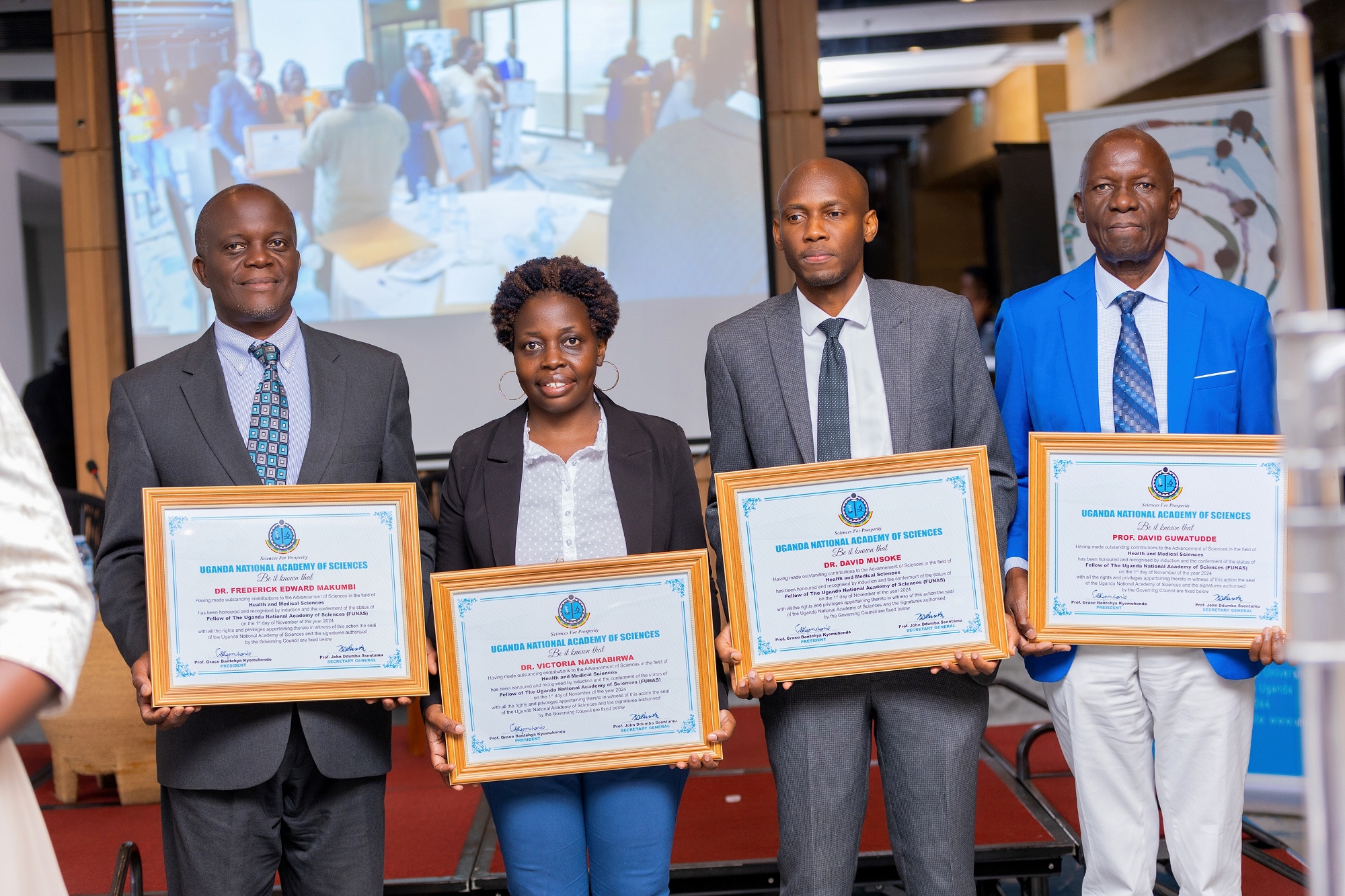
Four Makerere University School of Public Health (MakSPH) faculty have been inducted for the 2024 Uganda National Academy of Sciences (UNAS) fellowship, a preeminent nation’s most respected scientific bodies. This is the first time MakSPH is scooping a large number of faculty fellows, which was the highest for a single institution. This prestigious honor was awarded on Friday, November 1, 2024, at Four Points by Sheraton Kampala, Uganda.
The recipients are;
⦿ Professor David Guwatudde, a Professor of Epidemiology and Biostatistics at the MakSPH where he has been teaching for over 32 years. In the last decade, Dr. Guwatudde’s research interest has been on characterising the epidemiology, evaluattion and effectiveness of appropriate interventions for prevention and control of selected non-communicable diseases (NCD) especially diabetes and hypertension.
⦿ Dr. Fredrick Edward Makumbi, an Associate Professor of Biostatistics at MakSPH in the Department of Epidemiology and Biostatistics. A seasoned public health professional in Uganda, he is also a Gates Fellow. Through his expertise in population health and the evaluation of public health interventions, Dr. Makumbi has generated significant evidence that impacts the field. He has published over 300 journal articles and leads the PMA project, which focuses on evaluating schistosomiasis and family planning initiatives in Uganda.
⦿ Dr. David Musoke, a Senior Lecturer in the Department of Disease Control and Environmental Health at MakSPH. He serves as the Chair of the Grants and Research Capacity Building Committee at MakSPH and is the President Elect of the International Federation of Environmental Health (IFEH). A graduate of Makerere University, his research interests include environmental health, malaria prevention and community health. He organized the first International Community Health Workers symposium which was held in Uganda, and is an academic editor and reviewer for several journals.
⦿ Dr. Victoria Nankabirwa, an experienced clinical researcher and Lecturer in the Department of Epidemiology and Biostatistics at MakSPH. She holds a PhD from the University of Bergen and is also a member of the WHO Immunization and Vaccine-related Implementation Research (IVIR) Advisory Committee. Her key interests include mother and child outcomes, particularly survival and the impact of immunization.
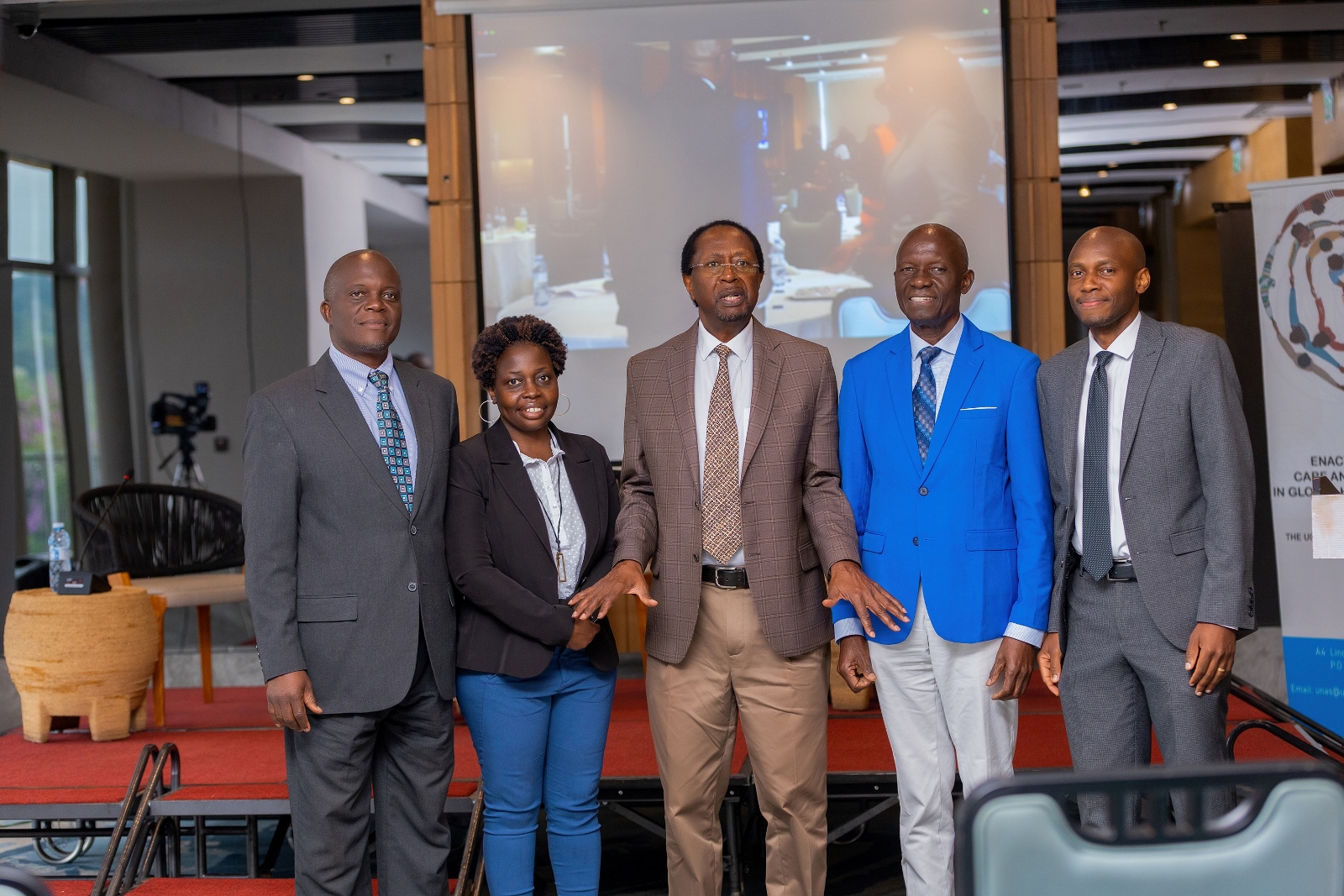
UNAS is an independent, non-profit, and non-political organization, established and founded in October 2000 to provide Uganda with credible, balanced, and evidence-driven guidance on matters of science and development. Membership is drawn from distinguished scientists and scholars who have made significant, lifelong contributions across diverse fields, including natural and social sciences, arts, and humanities.
The UNAS Fellowship remains one of the nation’s most respected scientific bodies, with over 200 members working collaboratively in interdisciplinary and transdisciplinary fields to address Uganda’s challenges through science and innovation.
Every year, Fellows of the Uganda National Academy of Sciences (FUNAS) have an opportunity to nominate potential fellows into the academy based on their merit, impact and contribution of the world of Science. A nomination stands substantive once it is seconded by another FUNAS, after which the nominees go through a rigorous selection process by a highly competent committee of scholars in the academy.
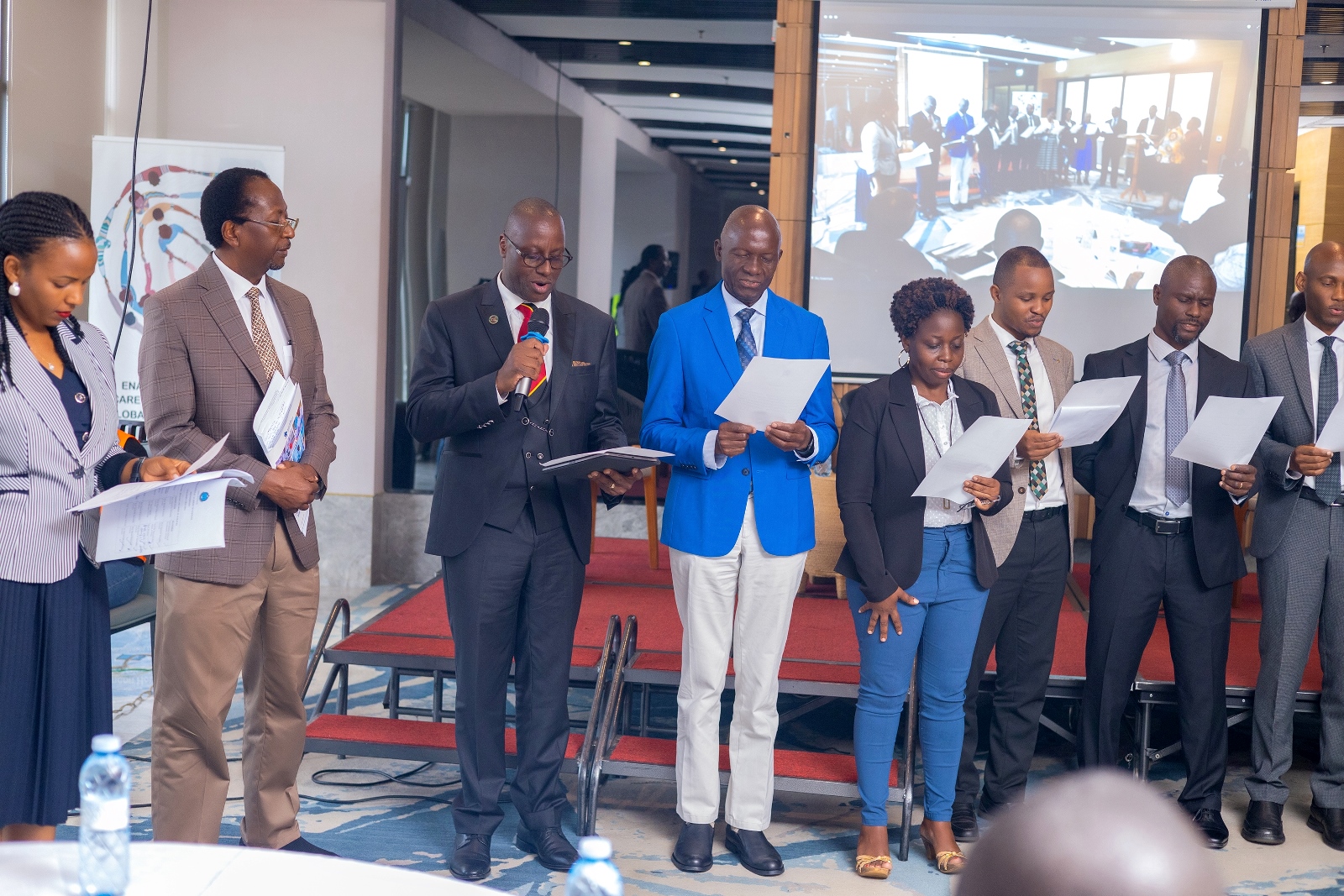
Once selected and inducted, fellows in the academy devote their time on honorific activities and service provision through arbitrating on contentious national debates such as whether to provide free social services to refugees and whether to use DDT to control Malaria. Since inception on October 20, 2000, the UNAS has distinguished itself as a premier honorific society for eminent scientists in Uganda. It leverages on the expertise and stature of its members to provide pro bono evidence-informed advice to government and Ugandans on science, technology, innovation and sustainable development.
Dr. David Serwadda, an Exemplar Scholar of Makerere University who this year received the prestigious Professor Emeritus title presented the new fellows to the UNAS convention. He described Dr. Nankabirwa as a prolific researcher, with over 80 publications in peer-reviewed journals and an impressive funding portfolio that includes a number of highly competitive research grants.
On her part, Dr. Victoria Nankabirwa said she was grateful for the recognition and pledged to uphold UNAS values.
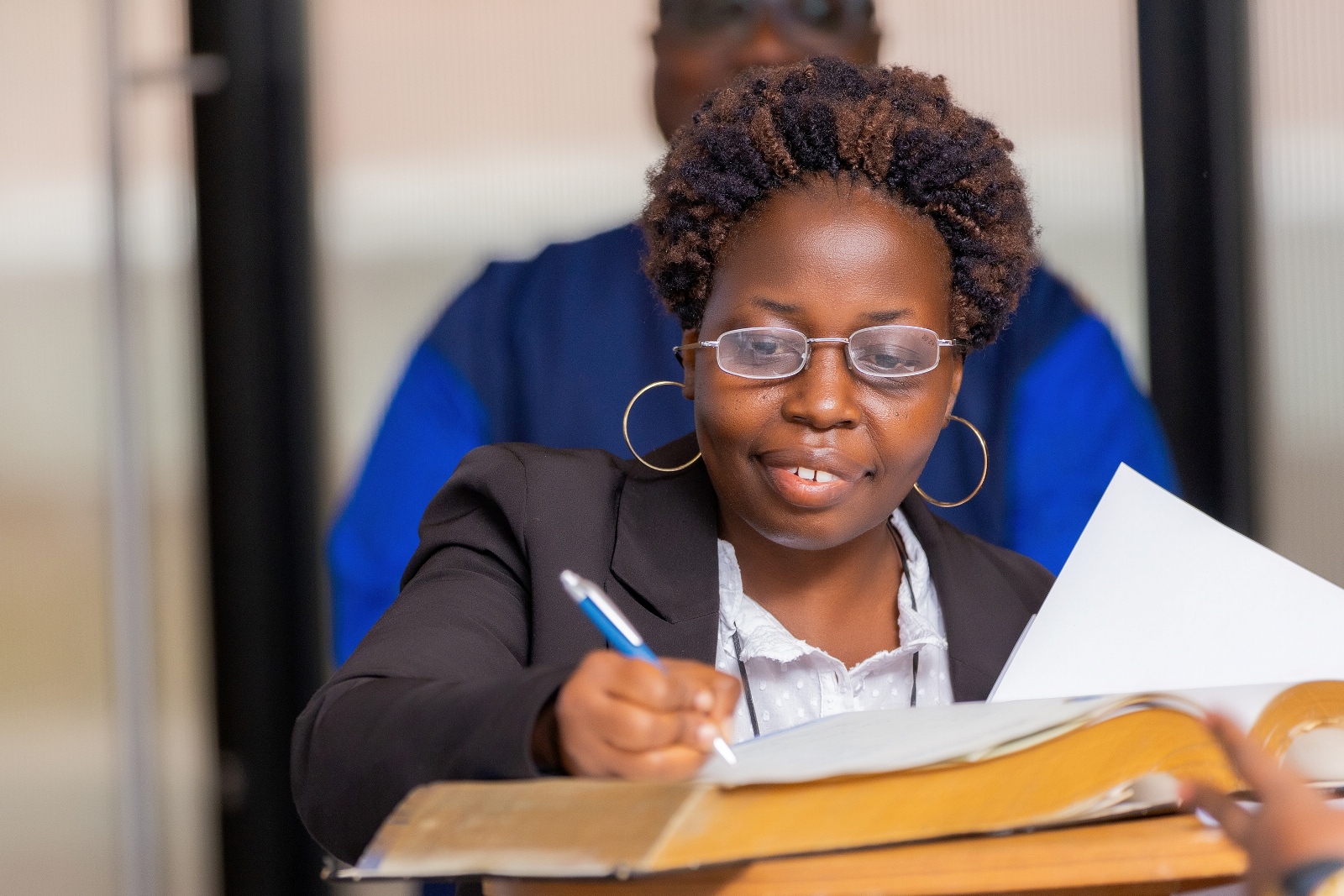
“I am very thankful for this recognition, and as I reflect on the journey that has brought me to this point, I am reminded that this is not the result of solitary work but of shared aspirations, collaborations, and partnerships. As such, I am very thankful to my nominators and seconders, Prof. David Serwadda and Prof. Rhoda Wanyenze, as well as to my colleagues, my students, and my family, represented by my mum. To these people and to you, I extend my deepest gratitude. I pledge to uphold the academy’s values, advocate for science-driven policies, and mentor future generations. I will work as hard as I can within this FUNAS,” said Dr. Nankabirwa.
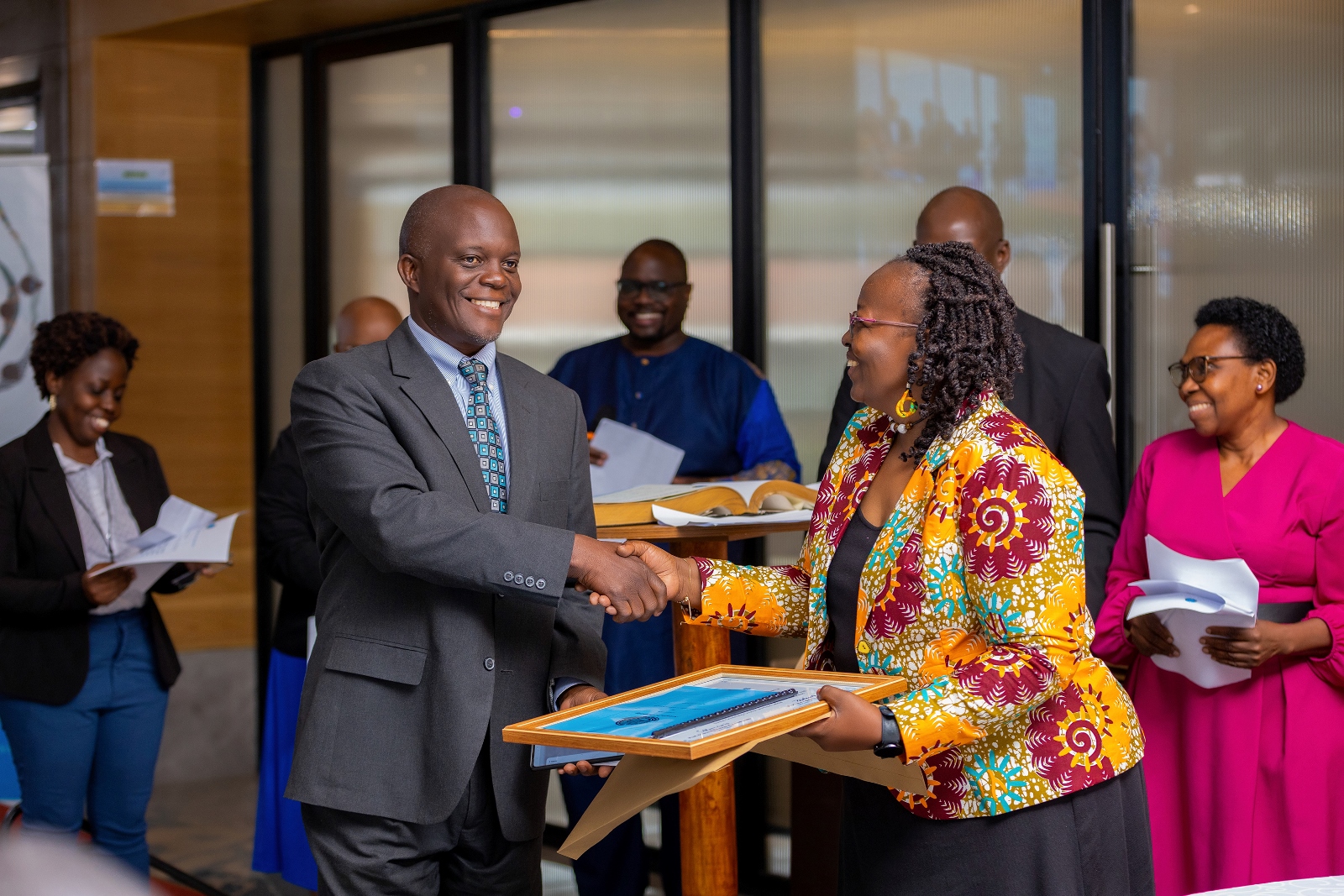
Dr. Fredrick Edward Makumbi expressed his gratitude and commitment during his recent induction as a fellow of the Uganda National Academy of Sciences (FUNAS). “I am delighted to have been nominated and accepted as a FUNAS. I am truly appreciative and acknowledge the support of all those who have helped me, from my family to my teachers and colleagues—many of whom are here today. They have supported me and brought me to this great podium. I pledge to continue working, supporting, and promoting the health and well-being of the people of Uganda and beyond through science, as well as mentoring others to ensure a sustainable generation that can uphold the health and well-being of Uganda and beyond. I am glad to be here, and thank you very much,” Dr. Makumbi stated.
Dr. David Musoke is a promising researcher and Senior Lecturer in the Department of Disease Control and Environmental Health at Makerere University’s School of Public Health. He serves as the Chair of the Grants and Research Capacity Building Committee and is the President Elect of the International Federation of Environmental Health (IFEH).
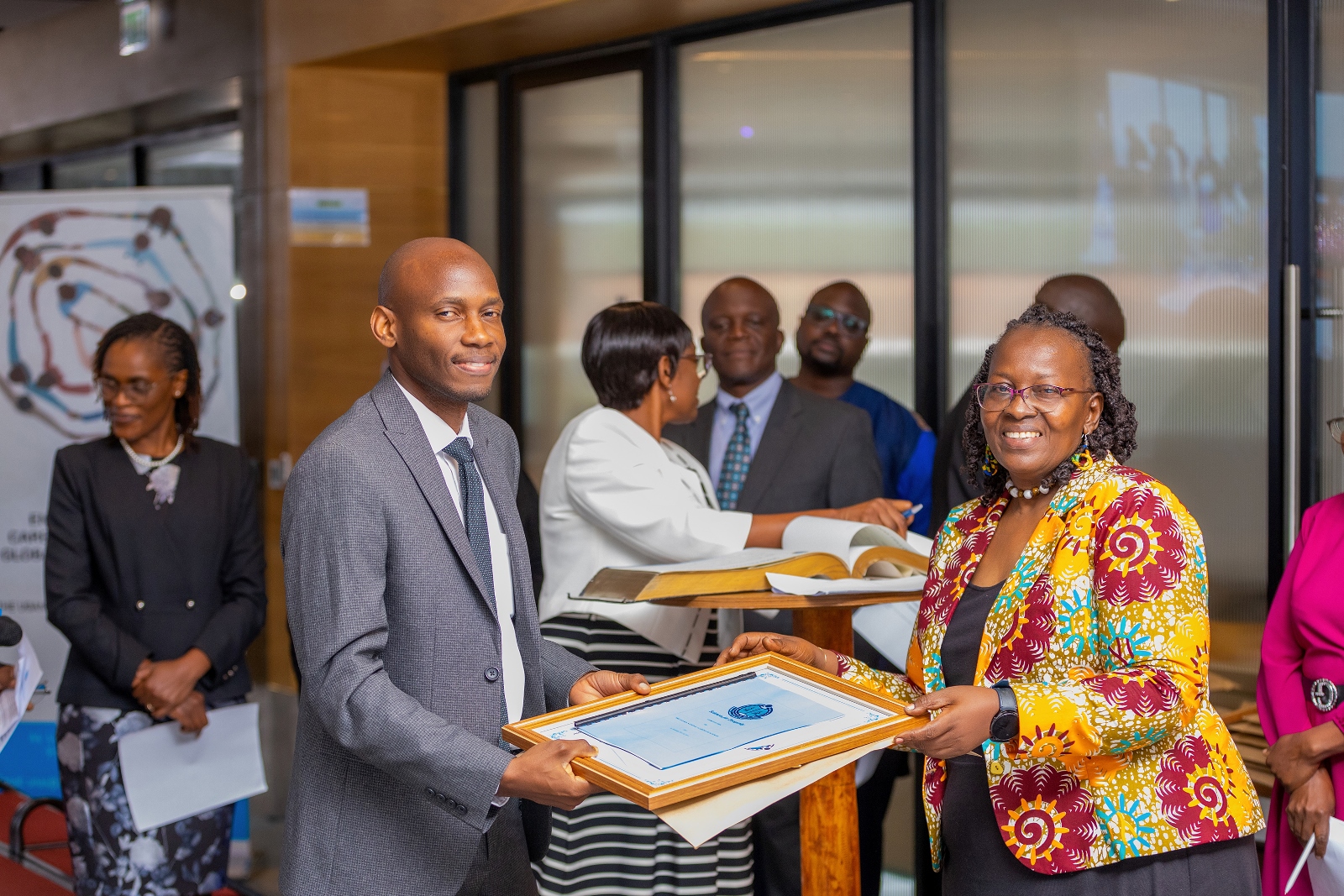
“I am really delighted and humbled to be joining this elite class of academics and scholars as a fellow of UNAS. It is an honor to join many of my mentors from over the years, including my very own father, who is also a fellow of UNAS and is here today, Prof. Miph Musoke. I wish to thank my family—my parents, wife, and children—for all their support, as well as the research teams we have worked with,” said Dr. David Musoke.
Adding that; “I also extend my gratitude to my mentors from the university, Professor David Serwadda and Professor Rhoda Wanyenze, for nominating me, along with all the others who have contributed throughout this journey, including funders, collaborators, the community, and everyone else we work with. I look forward to serving in this capacity and upholding the goals and aims of UNAS, especially in the field of Environmental Health and Community Health.”
Professor Guwatudde, a lead investigator in two national surveys assessing non-communicable disease (NCD) risk factors in his country—first in 2014 and again in 2023—expressed his commitment to tackling NCDs as he was recognized by the Uganda National Academy of Sciences (UNAS).
“I would like to thank the UNAS council, the secretariat, and all members for accepting me as a member,” Prof. Guwatudde said.
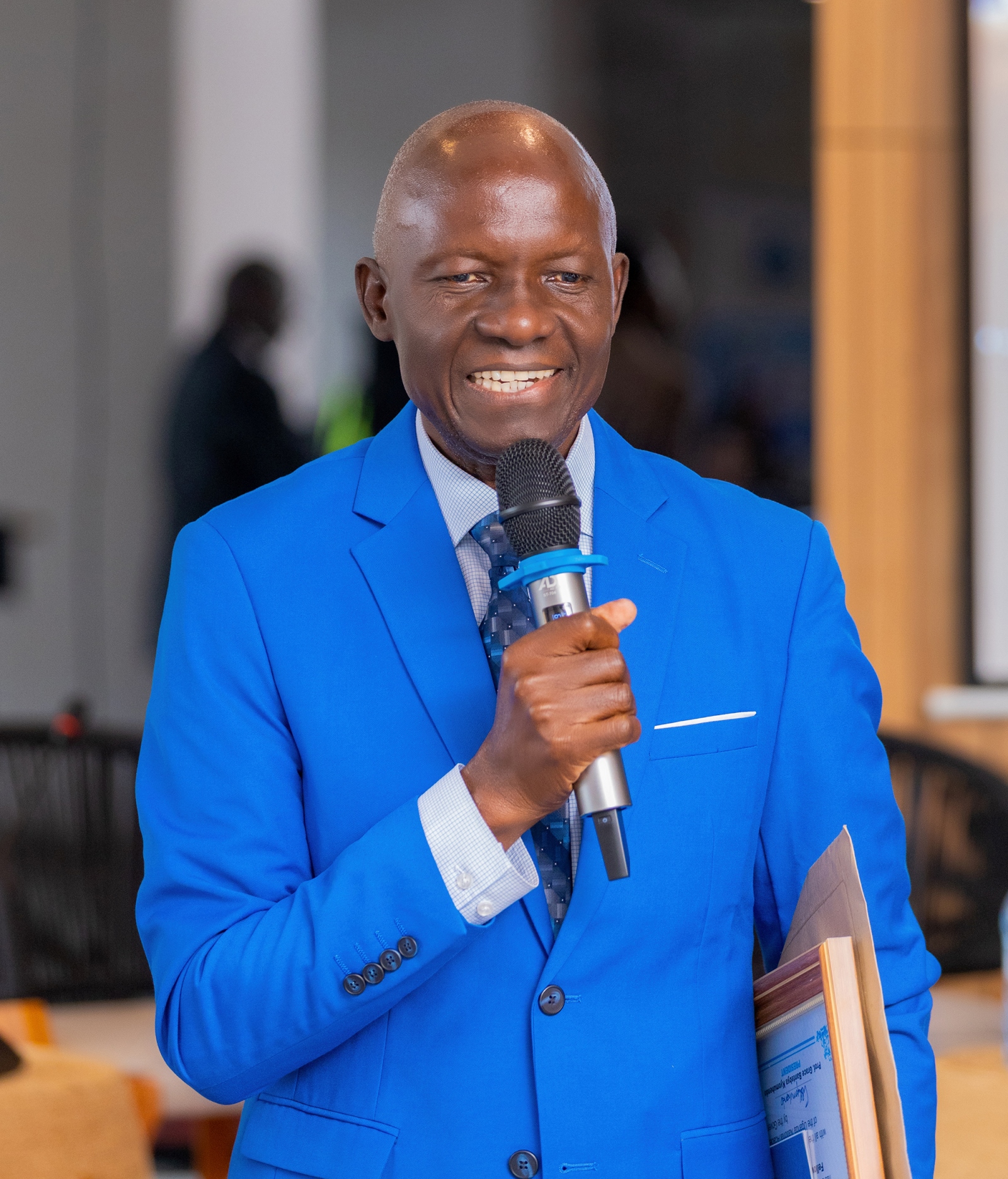
“I pledge to contribute in the area of non-communicable diseases. We have conducted extensive research in this country, giving us a clear picture of the NCD burden, a reality that affects us all. I would be glad to share this insight with fellow members,” added Guwatudde.
National academies worldwide provide neutral platforms for experts across disciplines to tackle societal challenges and clarify emerging issues in science, technology, and policy. These institutions play a crucial role in preparing for and responding to global threats such as pandemics. Since its inception, the Uganda National Academy of Sciences (UNAS) has been led by four presidents: Prof. Paul Mugambi (2000-2014), Prof. Nelson Sewankambo (2014-2019), Prof. Peter Mugyenyi (2019-2022), and, since October 2022, Prof. Grace Bantebya-Kyomuhendo, a Professor of Women and Gender Studies at Makerere University—the first female head of the academy.
Prof. Bantebya extended her congratulations to the newly inducted fellows. She emphasized the responsibilities UNAS fellows carry, including upholding the academy’s constitution and contributing to its vision, mission, and objectives. “Our fellows play a critical role in advancing the academy’s goals, and their dedication is vital to our impact on science and policy,” Prof. Bantebya stated.
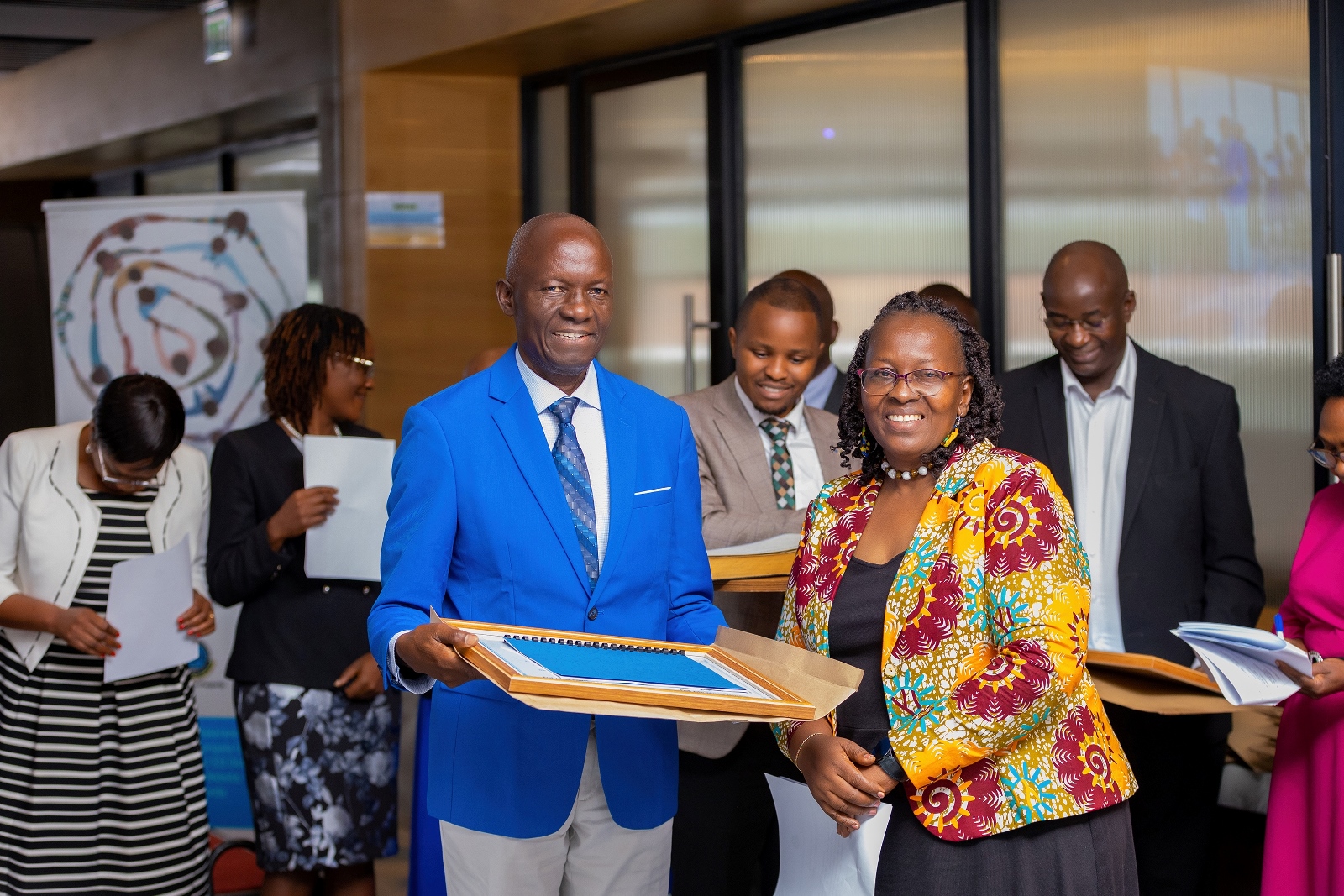
“Remain academically active. Please listen to that. In meaningful pursuit of academic excellence in your respective areas of expertise. Do not say that now that you have become a fellow, you will stop being academically active. We expect you to continue,” she emphasised.
She also called on the fellows to actively participate in the academy’s conventions, consensus-building efforts, and other activities. Prof. Bantebya emphasized the importance of consensus studies to the academy’s mission, urging fellows to make themselves available when called upon.
“Ensure high standards of conduct based on national and international best practices. We expect you to maintain and ensure high standards yourselves and foster good relations among members as well as with the academy, the general science community, and the public. You also need to meet all the obligations as a fellow of UNAS, whether financial or otherwise, as stipulated,” the Academy President said
A fellow may lose their membership in the academy if they act against the UNAS constitution or bring disrepute to its goals, name, or vision. Membership can also be terminated if a member is convicted by a competent court or authority of a felony or serious crime, or if they are declared bankrupt or of unsound mind.
UNAS’s mission is to foster the welfare and prosperity of the Ugandan people by generating, sharing, and utilizing robust knowledge and insights to deliver independent, merit-based scientific counsel to government and society. As part of the global scientific community, UNAS maintains strong ties with the Network of African Science Academies (NASAC), Network of Science Academies in Islamic Countries (NASIC), the U.S. National Academies, IAP, and TWAS.
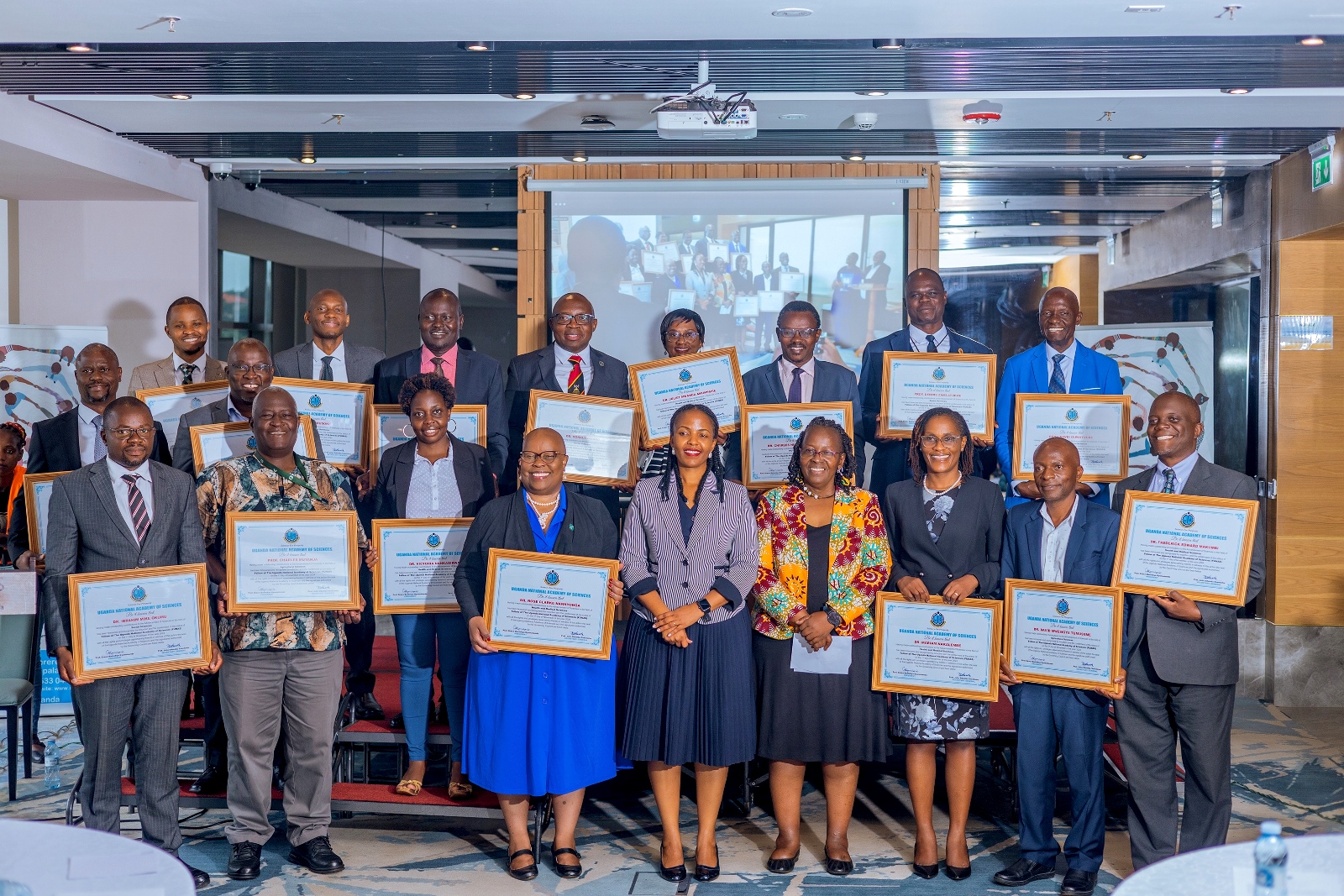
You may like
-


Call for Applications: Responsible Conduct of Research (RCR) Training Course
-
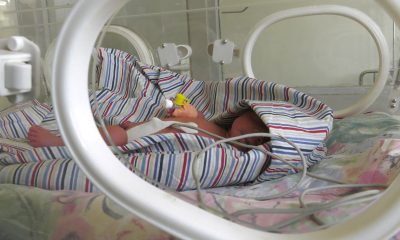

Call For Applications: PhD Fellowship Training Position
-
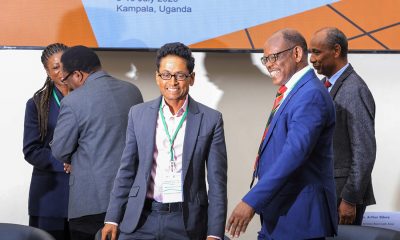

Makerere Hailed for Its Leadership in Health Policy and Knowledge Systems
-
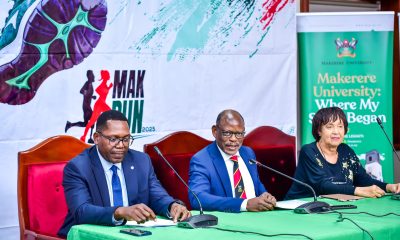

NCBA Commits UGX 1.45 Billion to Makerere Marathon, Pledges Five-Year Support for Inclusive Education
-
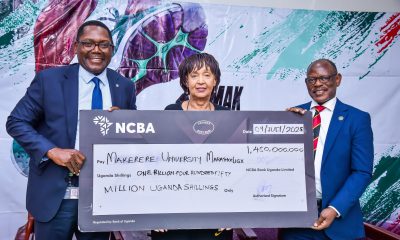

Mak Marathon Unveils NCBA as Platinum Sponsor
-
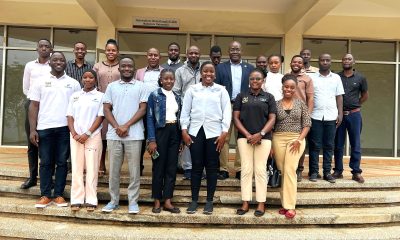

SophiA Project Upgrades Medical Infrastructure at Buvuma Health Centre IV, Trains Technicians for Maintenance Works
Health
Call for Applications: Responsible Conduct of Research (RCR) Training Course
Published
2 days agoon
July 11, 2025By
Mak Editor
The Responsible Conduct of Research (RCR) Training Course, scheduled to take place from July 30th to August 1st, 2025, at the Makerere University College of Health Sciences’ Conference Room.
Background
The SUSTAIN: Advancing Makerere University Masters of Health Sciences in Bioethics program at Makerere University College of Health Sciences aims at developing and institutionalizing a mentorship program in research ethics that facilitates development of bioethics professionals and health researchers who are committed to the growth and application of research ethics in Uganda’s academic and research institutions to the highest possible degree. The Responsible Conduct of Research (RCR) course is one of the short courses that introduces trainees to a framework that involves application of established scientific, professional norms and ethical principles in the performance of all activities related to scientific research.
Course objectives
At the end of this course, trainees should be able to identify, manage and prevent research misconduct.
Course outline
Introduction to RCR; Introduction to Professionalism and Ethics; Human subject’s protection and regulatory framework in Uganda; Humane handling of animal research subjects; Conflict of interest;
Responsible laboratory practices; Mentor-mentee relationships; Collaborative research international, industry); Peer review; Research misconduct (including policies for handling misconduct); Community involvement during research in a low resource setting; Responsibility to society and environment; Responsible financial management; Data acquisition, management, sharing and ownership; Responsible authorship, publication and communication.
Target group
The Responsible Conduct of Research course is targeted at Researchers, Research administrators, Research assistants, Study coordinators, Graduate students and Student supervisors. Certificates will only be awarded to participants with 80% attendance.
Course fee: 205,000/=, or 56USD is payable.
The course fee will cater for meals and refreshments during the training period.
Payment & Registration procedure:
9030026194023, Stanbic Bank, Mulago, Makerere University Biomedical Research Center Limited
Dollar Currency:
9030026194147, Stanbic Bank, Mulago, Makerere University Biomedical Research Center Limited
Please Note: Share payment details on email/whatsup and a hardcopy deposit slip delivered on the first day of the training to Miriam Musazi, Department of anatomy, Bioethics Centre, Room C4,
Mob: +256 782 363 996/ +256 701 363 996, Email: mmusazi@gmail.com.
NB. Only those who will have paid by this date will be considered for the course
Venue: The training will take place at Makerere University College of Health Sciences’ Conference room
Health
Call For Applications: PhD Fellowship Training Position
Published
3 days agoon
July 10, 2025By
Mak Editor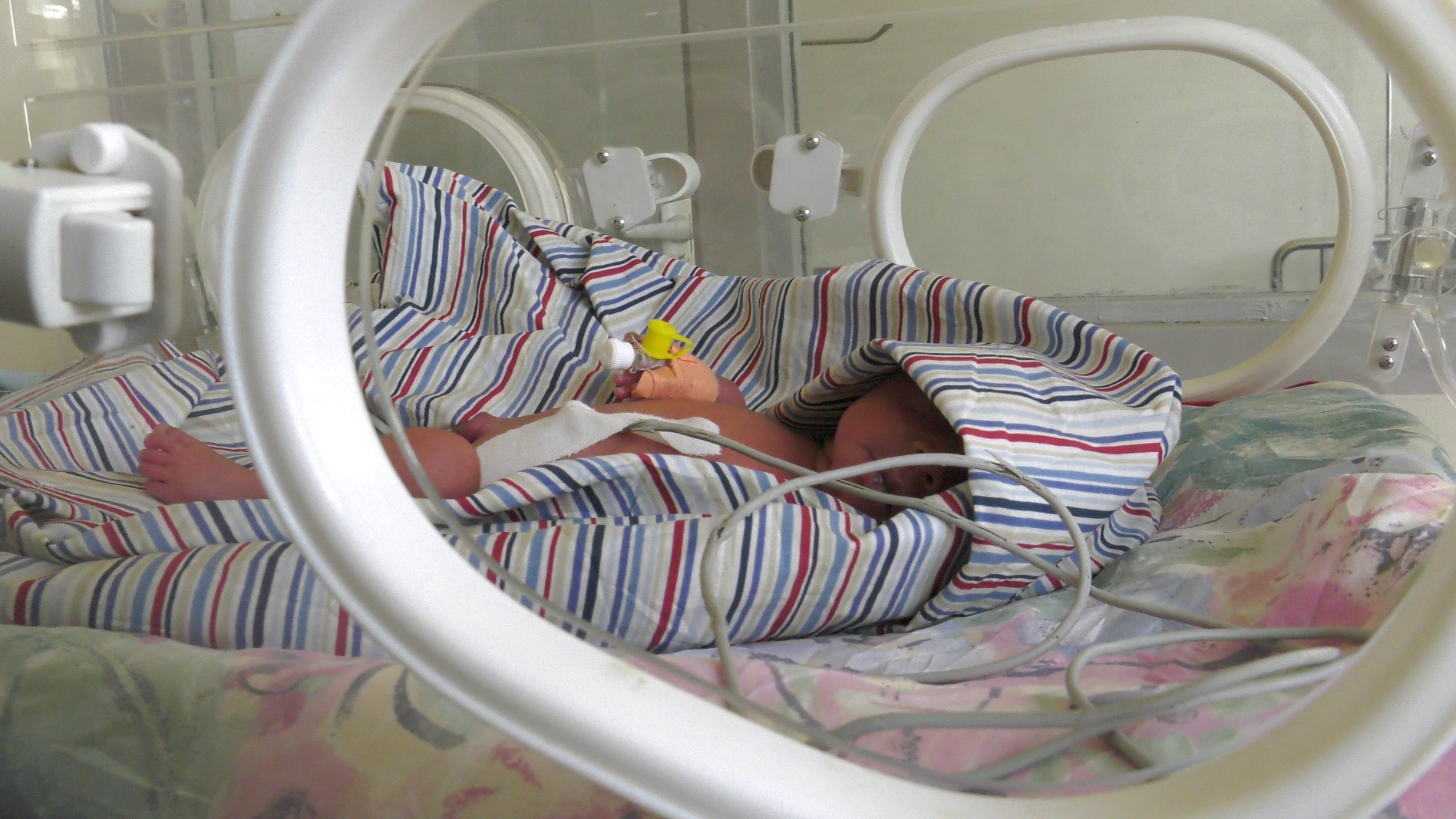
Background:
Makerere University College of Health Sciences (MakCHS), Kampala, Uganda and Global Health Uganda (GHU); in collaboration with other research consortium partner institutions, including, Kenya Medical Research Institute (KEMRI), Kisumu, Kenya; Training and Research Unit of Excellence (TRUE), Blantyre, Malawi; University of Bergen, Bergen, Norway; University of Amsterdam, The Netherlands; and Liverpool School of Tropical Medicine (LSTM), UK have been conducting clinical research on Malaria Chemoprevention. This research has focused on Malaria Chemoprevention in vulnerable patient populations, including children with severe anaemia, children with sickle cell anaemia and pregnant women. As an example, two of our recently completed studies are “The post-discharge malaria chemoprevention in children with severe anaemia [https://pubmed.ncbi.nlm.nih.gov/33264546/] and Malaria chemoprevention in children with sickle cell anaemia [https://pubmed.ncbi.nlm.nih.gov/39718172/]”.
With support from the UK Research and Innovation (UKRI) body, the consortium is expanding these studies to children with severe acute malnutrition, by conducting a large multi-centre randomized controlled trial entitled “Chemoprevention of malaria in the postdischarge management of children with severe acute malnutrition in Malawi and Uganda”.
In Uganda, the study will be conducted at one or two of their study sites in Jinja Regional Referral Hospital, Hoima Regional Referral Hospital or Kitgum General Hospital. Makerere University College of Health Sciences (MakCHS) and Uganda and Global Health Uganda (GHU) seek to appoint a full-time PhD Fellow, on this study. This will be a 4-year post, tenured at Makerere University and hosted at MakCHS.
Expectations of the PhD fellowship:
The PhD fellow will:
- Be a part of the main trial team, and participate fully in its implementation. However, he/she will be expected to design and develop his/her PhD research project, nested in the main trial.
- The area of study will be around “interactions between anaemia and severe acute malnutrition (SAM) in children or the interactions between malaria and severe acute malnutrition in children”.
- Conduct rigorous research, leading to high quality scientific publications.
- Submit a full research concept and obtain registration in the University by end of year-one. As such, there be an initial appointment for one year, renewable upon satisfactory performance.
- Academic mentorship and supervision will be provided by the research consortium (see above – composed of national and international researchers).
- Doctoral scholarly support and training environment, as well as didactic training in research methods and scientific writing skills will be provided by Makerere University.
- The funding support will cover tuition and a competitive monthly stipend for 4 years, scientific conferences fees/travel and other research-related costs.
Prospective candidates must:
- Hold Master’s of Medicine in Paediatrics and Child Health from a recognized university, and licensed to practice medicine in Uganda by the UMDPC.
- Possess undergraduate training in Medicine and Surgery (MBChB/MBBS/MD).
- Willingness to fully commit time and effort to their PhD studies, expected to start immediately
- Candidate should not hold other/concurrent fellowships
- Having publication experience will be an added advantage.
- Be highly motivated and willing to commit to a career in research and academia.
Application procedure:
Interested applicants should submit their application and supportive documents – listed here below, in one PDF document, in an email titled “PDMC-SAM–PhD Fellowship Application” to hr@globalhealthuganda.org [and cc – chdc.desk@mak.ac.ug] by 25th July 2025. The documents should include the following:
- An application letter (Max. 1 page)
- Motivation statement (Max. 500 words)
- CV (Max. 2 pages), including a list of publications
- Two (2) recommendation letters
- Academic transcripts and certificates for all university qualifications
- A synopsis focusing on the proposed PhD research work, describing briefly what is already known/burden, challenges, the gaps and potential interventions (include references) [Max. 800 words].
Health
Makerere Hailed for Its Leadership in Health Policy and Knowledge Systems
Published
4 days agoon
July 9, 2025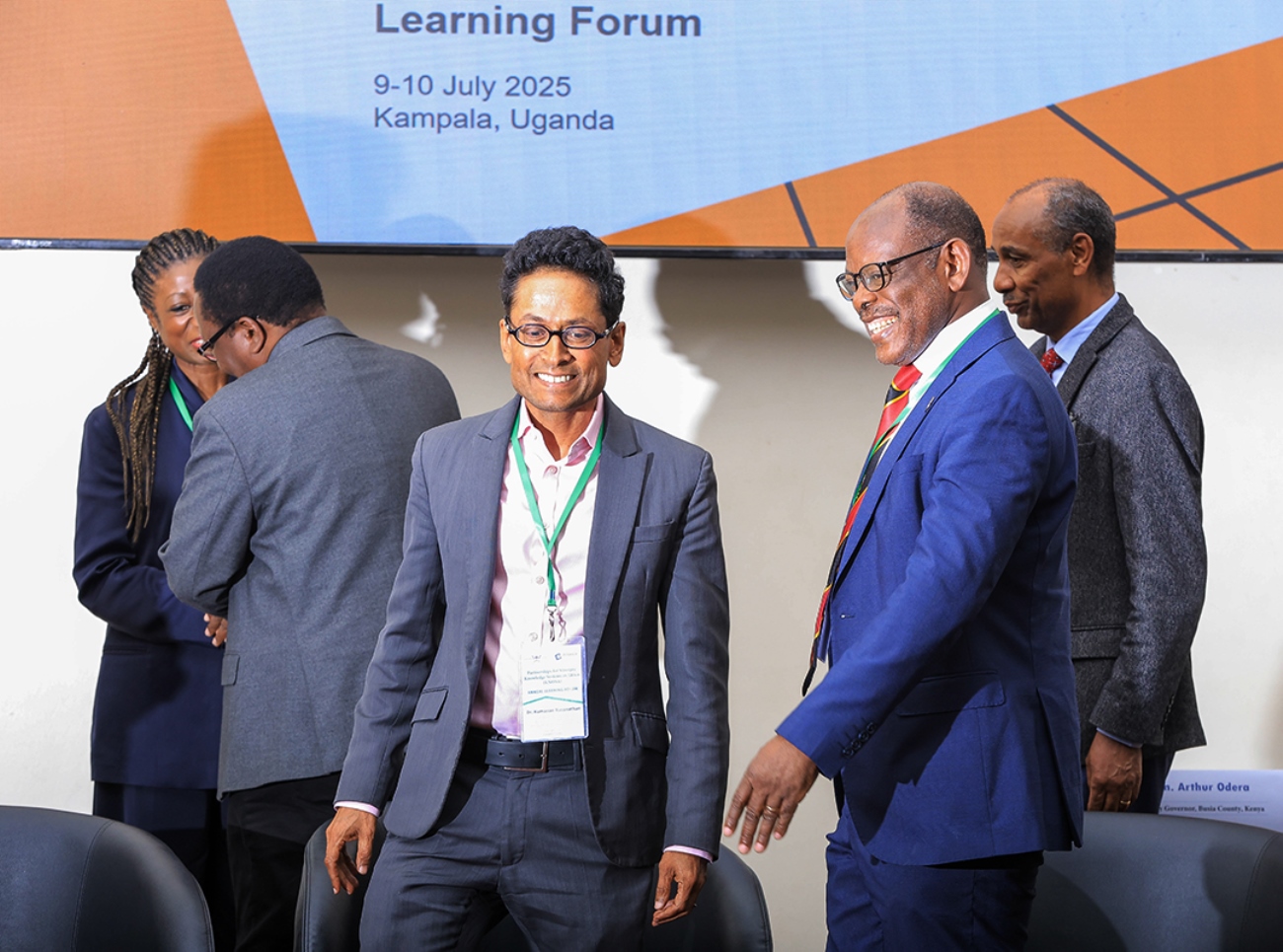
KAMPALA, July 9, 2025 — Makerere University has been hailed as a continental and global leader in health policy and systems research. This recognition came during the Partnerships for Stronger Knowledge Systems in Africa (KNOSA) Learning Forum, held July 8–10, 2025, hosted by Makerere University School of Public Health (MakSPH) with support from the WHO Alliance for Health Policy and Systems Research.
Delegates from Uganda, Kenya, Ethiopia, and Somalia applauded Makerere’s role in advancing evidence-informed policymaking and strengthening national knowledge systems. The forum highlighted the institution’s trusted leadership, practical research, and commitment to driving real change.
Dr. Kumanan Rasanathan, Executive Director of the WHO Alliance, praised Makerere’s long-standing role in bridging research and policy:
“You are a shining beacon on the continent and for the world,” he said. “In this moment of crisis, where every health investment must be efficient and equitable, Makerere’s leadership matters more than ever.”
He emphasized the Alliance’s 25-year partnership with Makerere: “We know Makerere University very well. My predecessors have worked with the Alliance since its inception in the 1990s. Makerere has been especially instrumental in advancing the field of health policy and systems.”
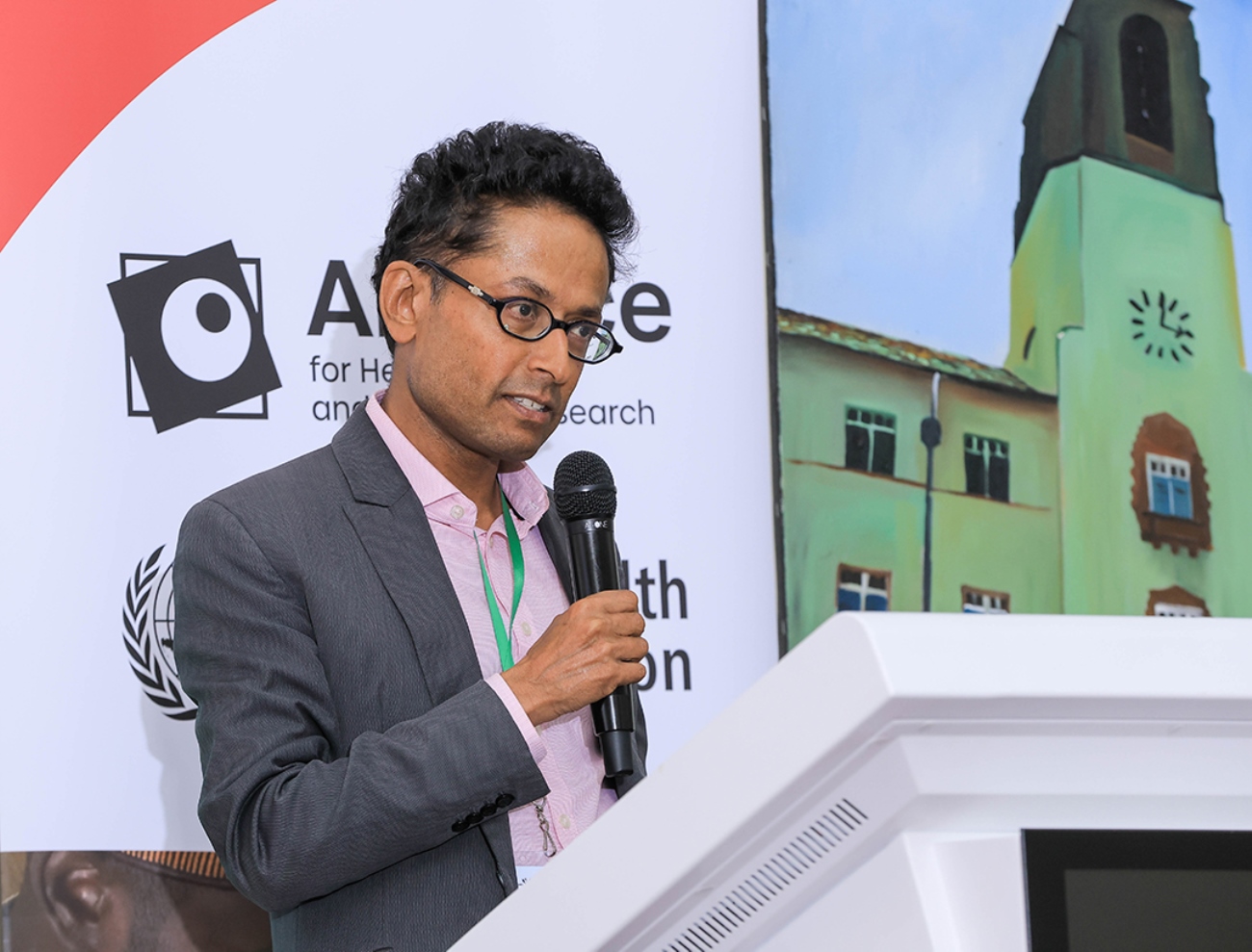
Dr. Rasanathan called for a move away from siloed approaches toward more adaptive, coherent systems. He reaffirmed WHO’s commitment to supporting regional initiatives like KNOSA that are driving this shift across Africa.
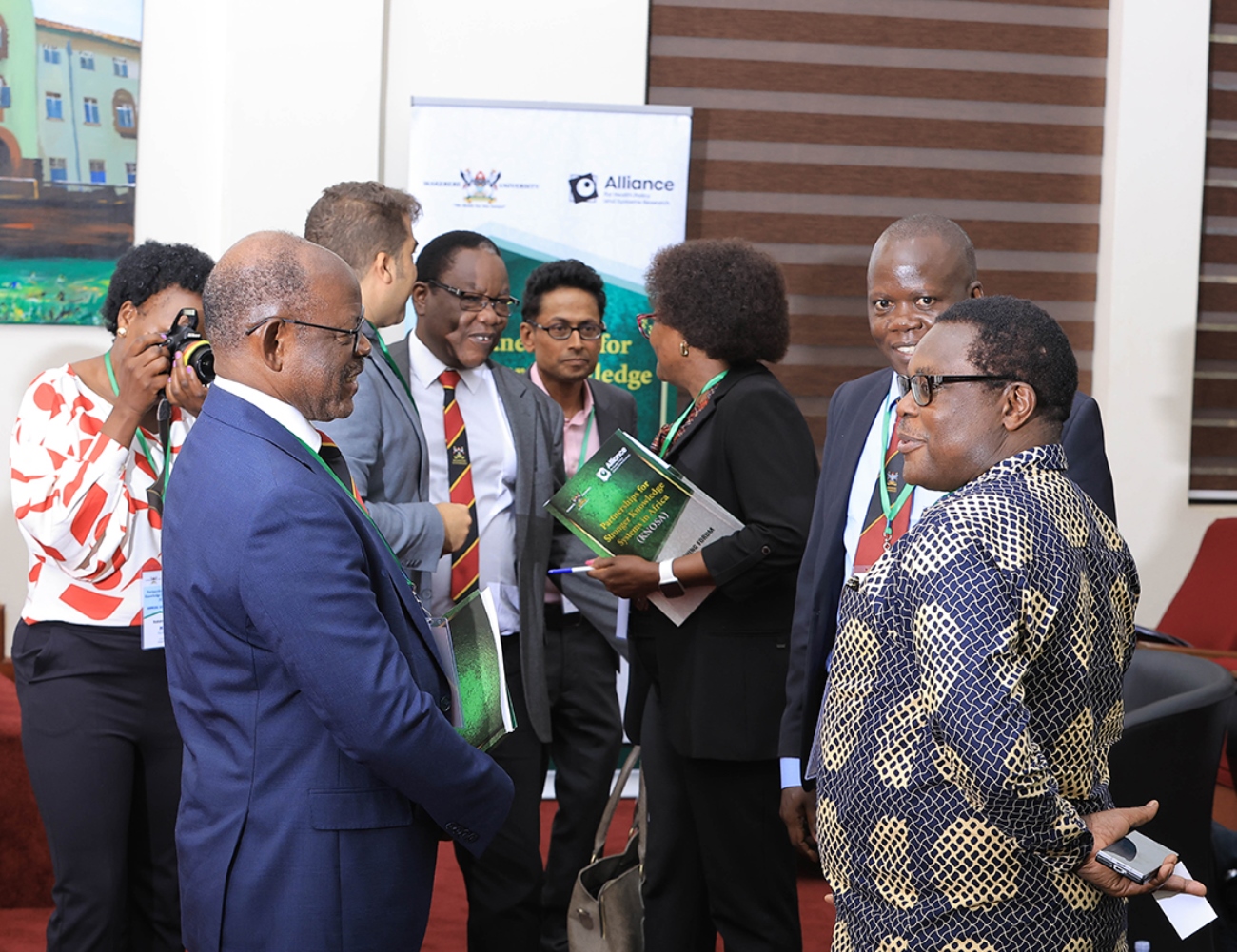
In the face of current funding cuts, Dr. Christine Musanhu of the WHO Uganda Country Office echoed these sentiments with a stern call to action: “In times of uncertainty, we need national systems that not only generate evidence but also understand and communicate it in ways that drive real change.”
She warned of tightening budgets, citing an 11% cut (roughly $67 million) in global funding for Uganda’s public health programs. “We are being asked to do more with less,” she said, urging countries to reprogram resources towards high-impact, evidence-based interventions.
Adding that, “Evidence must go beyond routine data—it is a measure of transformation.”
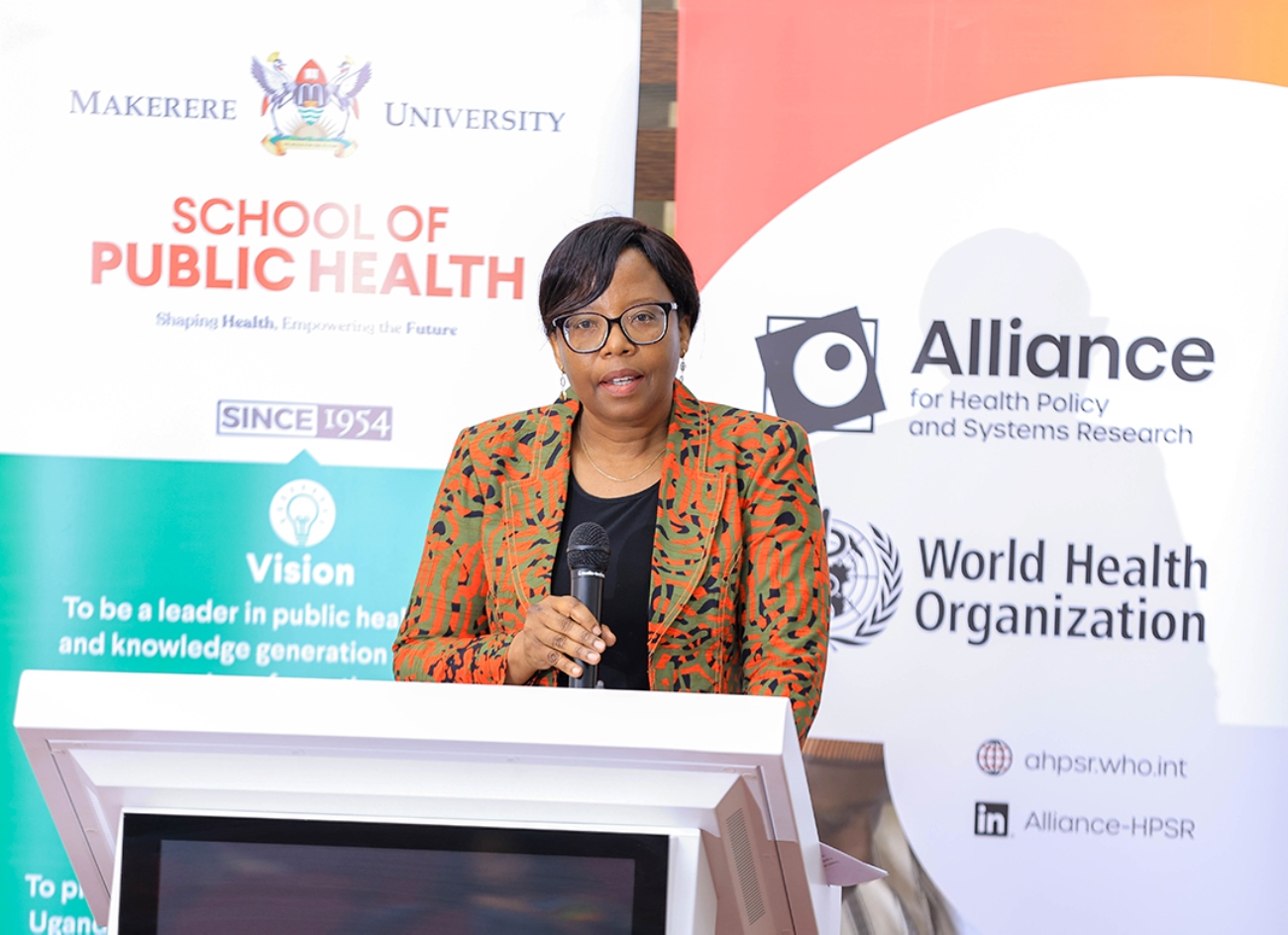
This year’s KNOSA forum focused on sharing country-level progress, refining evaluation approaches, enhancing communication products, including scientific publications, and engaging more deliberately with Uganda’s wider policy and research ecosystem.
Makerere University Vice Chancellor Prof. Barnabas Nawangwe, while sharing the institutional vision, called for African universities to lead from the front in addressing health and development challenges: “We can do all the research in the world, but unless it moves beyond our laptops and lecture rooms into real decision-making spaces, it won’t change lives.”
He noted that Makerere contributes over 80% of Uganda’s academic output and praised MakSPH and the College of Health Sciences (MakCHS) for innovations that have shaped responses to HIV, Ebola, and COVID-19. “Our work, backed by partnerships with government and global collaborators, is proof that African universities must lead from the front.”
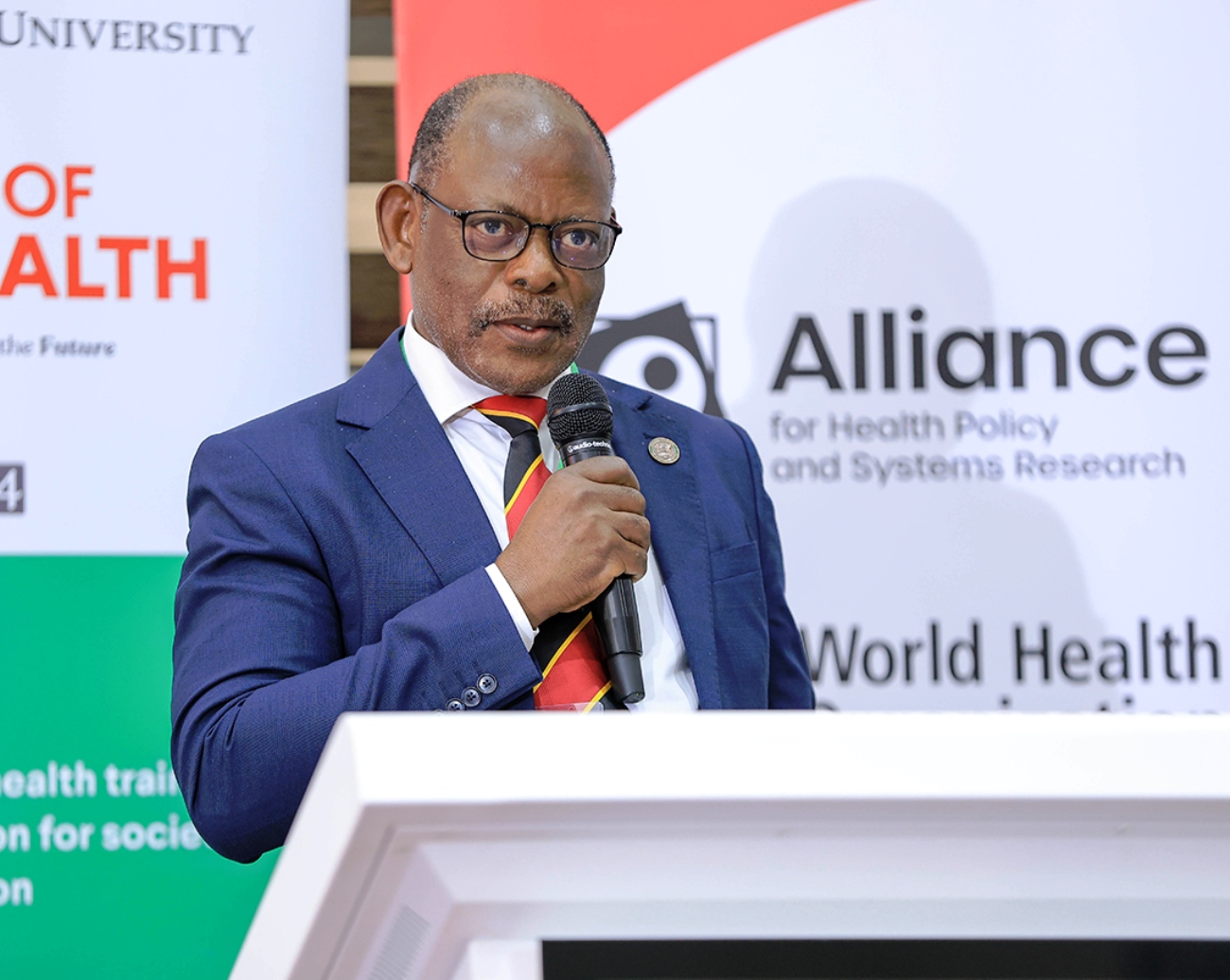
Professor Nawangwe urged deeper collaboration within KNOSA: “Our continent is interconnected. We cannot afford to work in silos. We are stronger together.”
Dr. Aku Kwamie, the unit head at the WHO-Alliance, noted that there is a need for partners to shift their thinking regarding policy. She particularly shared three critical transitions to institutionalize evidence use: embedding knowledge within institutions, not just individuals; linking research directly to decision-making; and advancing from isolated academic work to system-level thinking. These shifts, she noted, are essential for embedding evidence into routine governance.
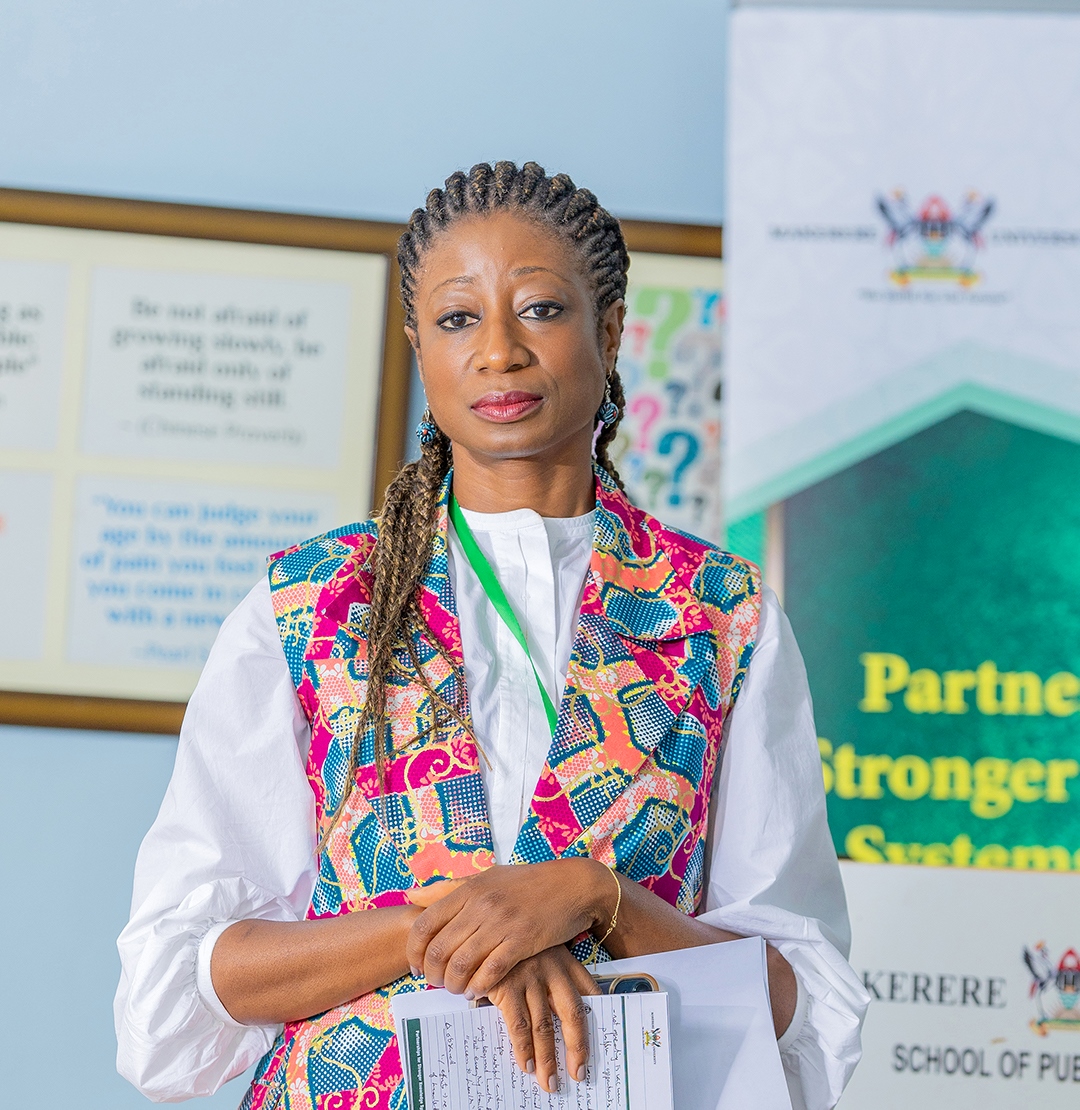
Professor Freddie Ssengooba, a Health Policy and Knowledge Systems expert at MakSPH, reaffirmed Makerere University’s regional leadership in the field and stressed the urgency for African countries to take full ownership of their health systems considering the shifting funding landscape:
“Health policy and knowledge systems research may not be as prominent as epidemiology or disease control,” he said, “but it’s central to how we harvest and connect knowledge with policy and resources. When the vaccine is here and the evidence is clear, that’s when they come to us, asking, “How do we achieve over 80% coverage?”
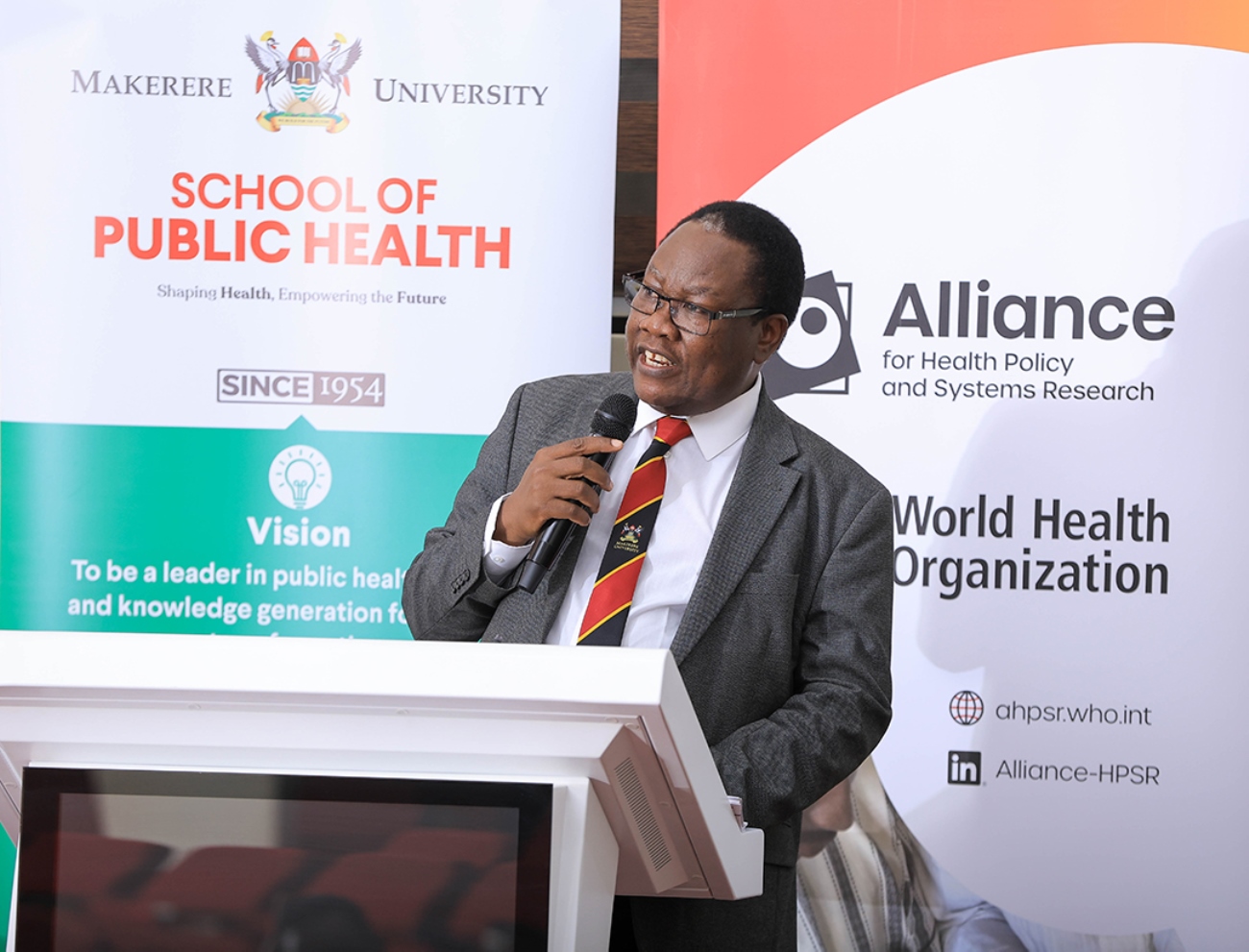
He praised KNOSA for helping elevate the field’s relevance: “There’s real appreciation for the work we do—not just with Uganda’s Ministry of Health, but across the region.”
Recalling the early collaboration with WHO, he said, “Back in 1997–98, a few of us, myself included, responded to an initial call and began what has now become a long-standing relationship with the WHO Alliance.”
“The Alliance is building capacity across Africa to ensure that research doesn’t stop at findings but goes on to shape decision-making and society,” he disclosed.
Professor Rhoda Wanyenze, the Dean of MakSPH, is currently ambitiously driving her colleagues, staff, and partners to embrace the culture of evidence use. She reiterated the School’s commitment to leading in evidence translation: “I’ve often told the Vice Chancellor—we at the School of Public Health are not in an ivory tower. We are deeply connected to real-world problems.”
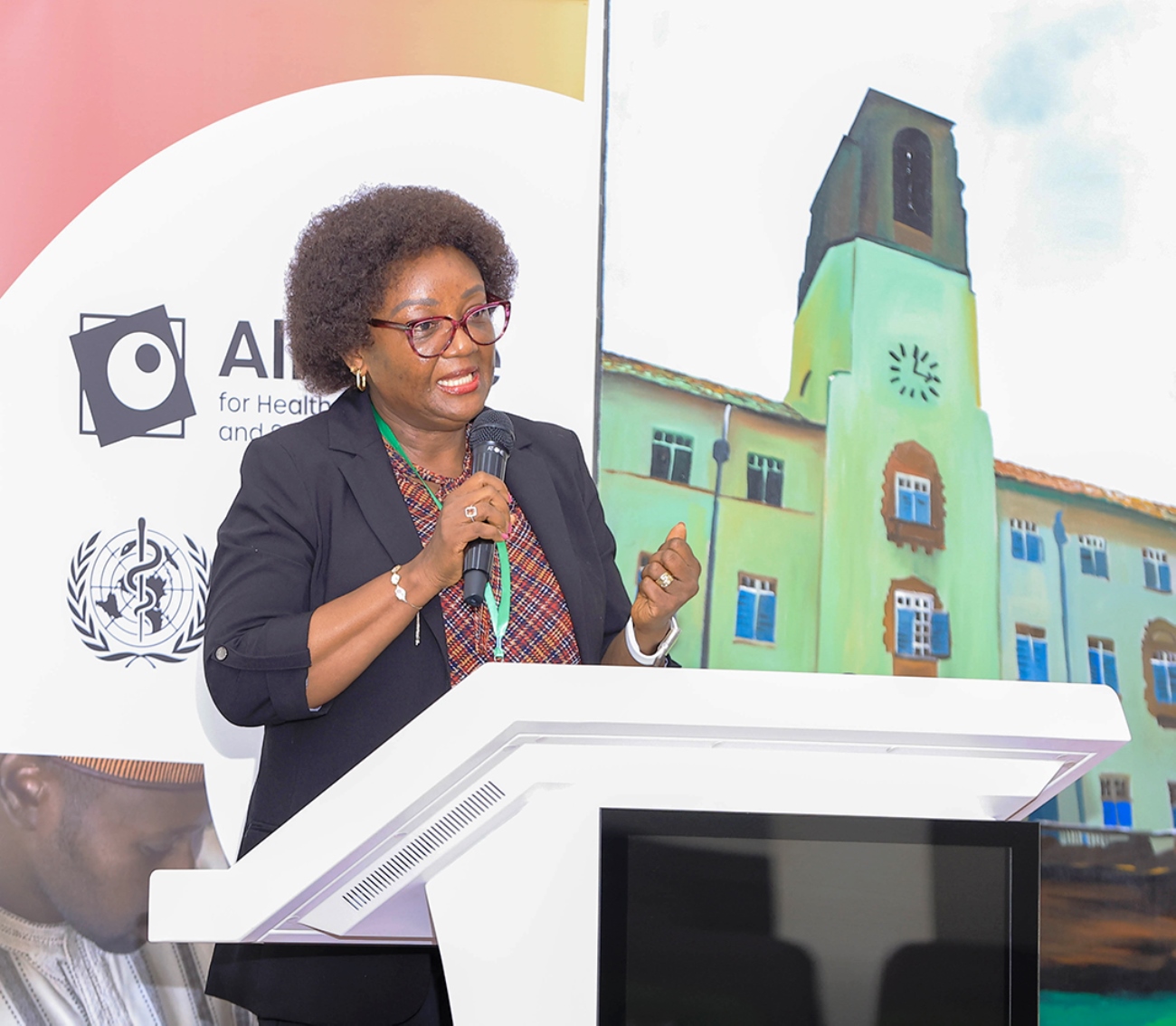
To her, the need for a clear framework to improve engagement with decision-makers and address uneven success in research translation has never been greater than now: “Yes, we publish in high-impact journals. But the question is, what change happened because of your evidence?”
“I would love to see the School lead in developing a framework that showcases what we’ve done well and identifies where we can grow.”
She also acknowledged Prof. Ssengooba’s influence in broadening the lens on knowledge management: “You’ve challenged us to think beyond institutions, to consider networks and systems. That’s a gap we must fill.”
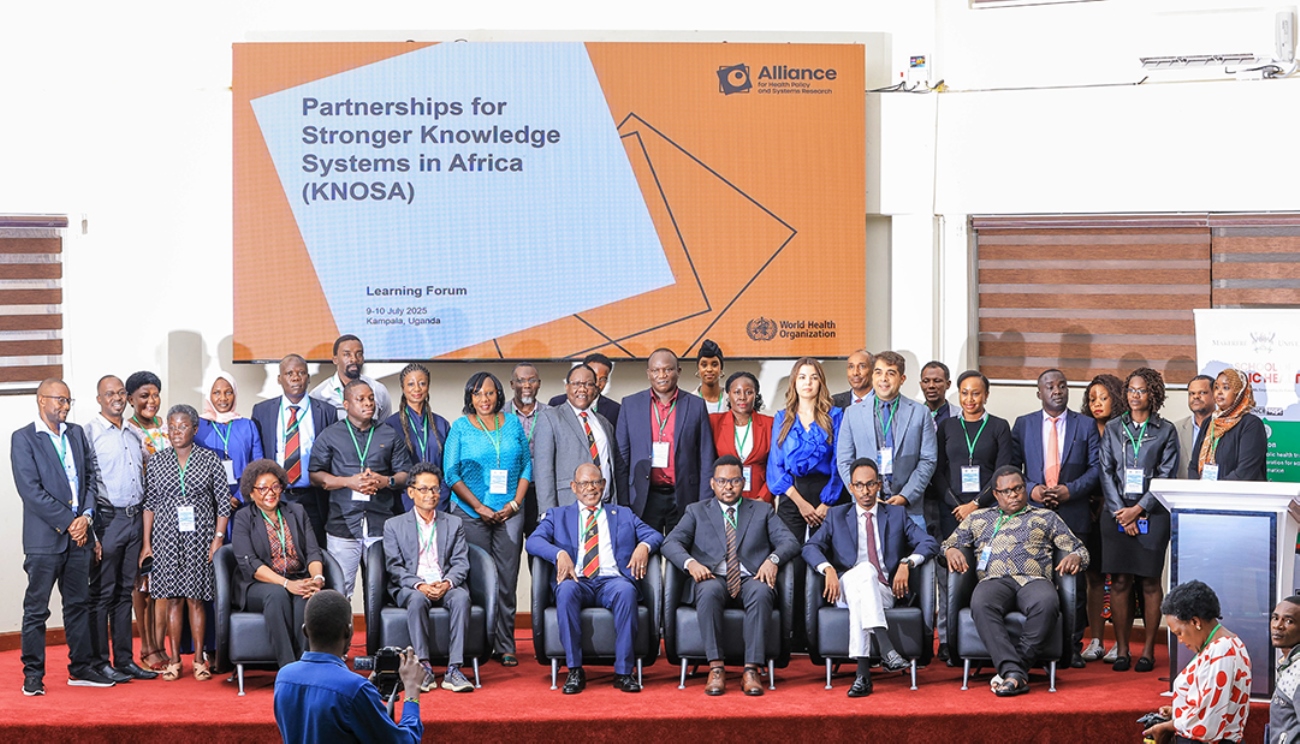
Trending
-

 Education1 week ago
Education1 week agoAdmission List to Bachelor of Education External (BED) 2025/26 -Private Sponsorship
-

 General2 weeks ago
General2 weeks agoUndergraduate Admission List Self Sponsorship Scheme 2025/2026
-

 General5 days ago
General5 days agoRe-advert: Admission to Undergraduate Programmes 2025/2026
-
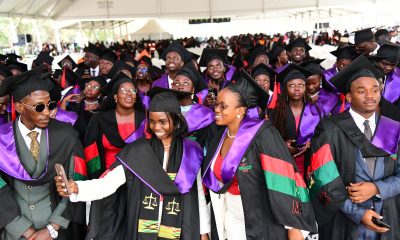
 General1 week ago
General1 week agoAdmission Lists for – Bachelor of Laws 2025-26
-
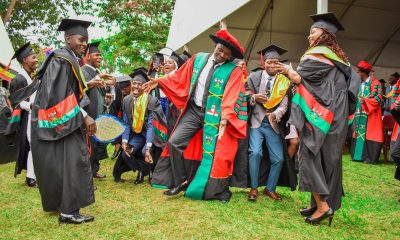
 General1 week ago
General1 week agoDiploma/Degree Holders Scheme – Self Sponsorship Admission Lists 2025/26
